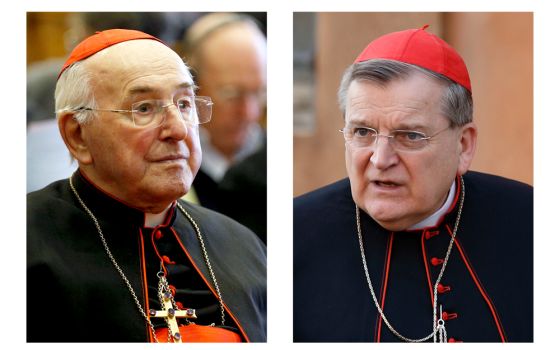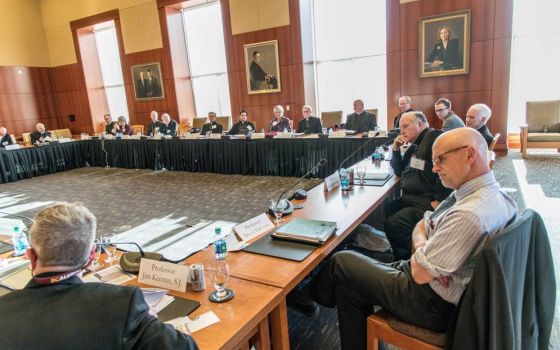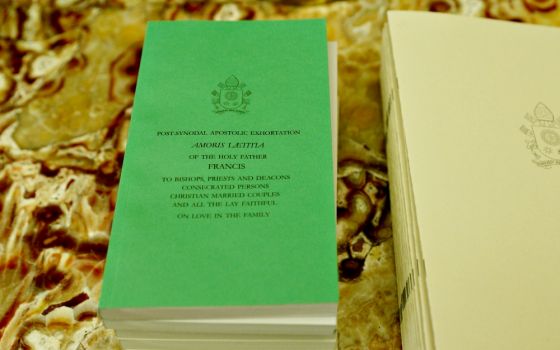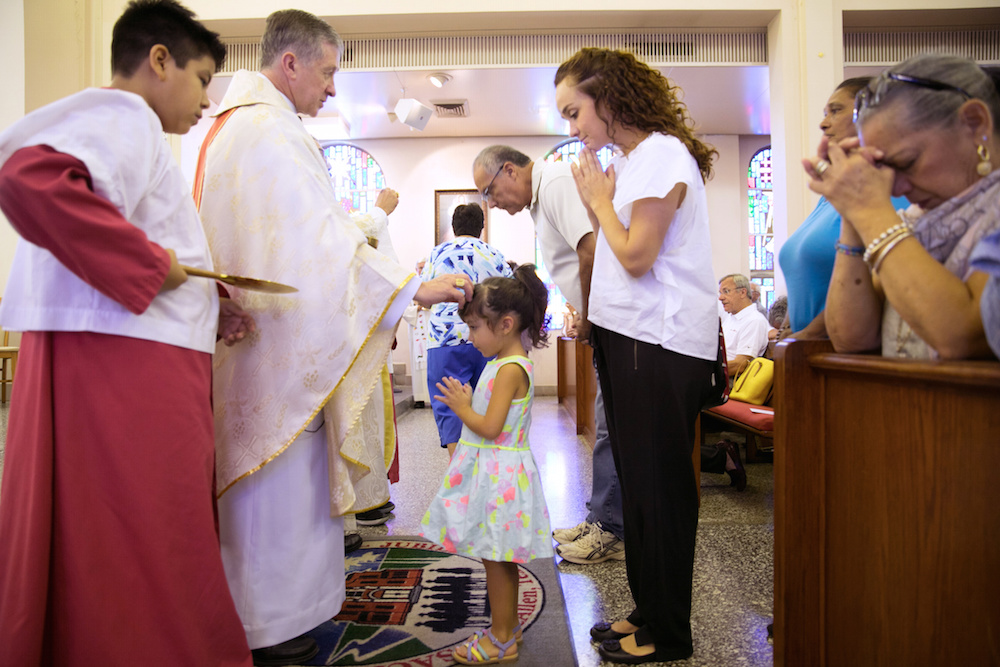
Cardinal Blase Cupich of Chicago gives Communion during Mass at Sacred Heart Church in McAllen, Texas in August. (CNS/courtesy Catholic Extension)
Last week's conference on Amoris Laetitia yielded many fascinating talks and highlighted different but congruent perspectives on the document. My colleague Joshua McElwee has already reported on the conference here and here. Today, I would like to look at the conference and specifically what it says about the shape of the debate over Amoris Laetitia.
At the beginning of the second day, I was standing outside the chapel before Mass with one of the organizers of the conference, and he asked me what I thought of the first day's proceedings. "Who knew there were eight other chapters in Amoris Laetitia?" I said somewhat jokingly. The most stunning fact about the two day event, which witnessed 18 talks, was how little time was spent discussing the controversial Chapter 8 which deals with irregular marital situations and specifically the question of how the Church ministers to the divorced and remarried. Chapters 2, 4, 5 and 7 were the most frequently cited. And more attention was placed on how to undertake marriage preparation, how to accompany newly married couples and those beginning to start a family, how to help families in crisis, whether those crises be moral or socio-economic, in short, more attention on the full range of issues families confront, not just on the narrow issue of how to minister to the divorced and remarried.
It is odd that those who say they oppose Amoris Laetitia spend so little time talking about Chapter 4 which sets forth a powerful and beautiful meditation on the spirituality of, and church teaching about, Christian family life. Consequently, they have not really focused on the key issue of strengthening families. If reciting Familiaris Consortio, St. Pope John Paul II’s 1981 apostolic exhortation on the family, was enough, surely the crisis in marriage and family life would have diminished. It hasn't. The bishops and theologians gathered at Boston College last week were facing that crisis both realistically and specifically through the lens of our Christian faith. I suspect the critics will be surprised when they read the proceedings to realize the degree to which this was the focus of the talks and, in humility, acknowledge the degree to which the critics' constant harping about Chapter 8 has distracted the church from the vitally important work.
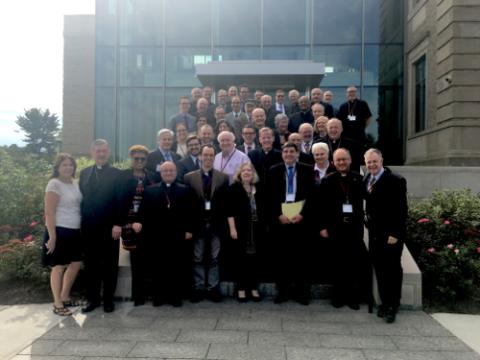
Participants of "Amoris Laetitia: A New Momentum for Moral Formation and Pastoral Practice," Oct. 5-6 (Courtesy of Boston College)
The second thing that stood out to me about the conference was the dialogical spirit of the event, dialogical on both the common and etymological sense of the word: People spoke with, not at, each other and the presentations, like the text of Amoris Laetitia itself, were rich in scriptural references. As Jesuit Fr. James Keenan, one of the principal organizers of the conference, said in conclusion, it was not just an experience of collegiality among the bishops or among the theologians, but among those two groups together, and this is an experience that has become far too infrequent in the life of the church in the United States.
At the conclusion of Vatican II, the University of Notre Dame hosted a series of lectures and discussions on the conciliar texts, looked at from an interfaith perspective. They brought together some of the leading bishops and theologians from the council to discuss the event in detail, explain things that were not obvious and nuances that permitted a variety of interpretations. The spirit of the meetings, and the book that followed, was collaborative.
Today, such collaboration is more difficult because of the polarization that has afflicted the church and the existence of a certain dumbing-down of debate. People hurls slogans, not arguments, at each other and mistake a fluency with the latest issue of First Things with theological competence. Theologians became suspicious of bishops and vice-versa. All that was swept away in Boston last week. No prelate stood on pretense nor invoked an authority based solely on his office. Theologians did not snarl, they engaged. The discussions were fruitful, not least because they intertwined theological reflection with actual, lived experience.
This evidence of collaboration leads to the third striking fact of the Amoris Laetitia conference, how grounded it was in reality. Cardinal Blase Cupich, the other principal organizer of the event, stated at the beginning of the conference: "If we look at the Scriptures, we see that God has chosen to reveal himself time and again in families, starting with Genesis. ... So, the question for us as ministers is not just how we can be at the service of people and families, but also how is God revealing himself in this privileged place?" Many of the talks focused on specific examples drawn from real family experiences and in the opening address, Professor Natalia Imperatori-Lee, of Manhattan College, made the point that one of the key themes of Amoris Laetitia, accompaniment, "helps guard against the romanticization of marriage and family life which is sometimes evident in church teaching." *
Advertisement
Another way the discussions were kept grounded in reality was the useful employment of social science data — another type of dialogue. Franciscan Sr. Katarina Schuth, and Professors Julie Hanlon Rubio, Meghan Clark and Hosffman Ospino all introduced important social science information into their papers. For example, Rubio, who is a member of National Catholic Reporter's board of directors, noted:
Married couples considering divorce would benefit from placing the vision of "Amoris Laetitia" for marriage alongside the social science data on divorce. There is some data suggesting that attempts to treat crises in marriage are inadequate. For instance, many marriage counselors do not have extensive training in couples counseling, so the emphasis can be skewed to the needs of each individual. Most Catholic parishes lack capacities for counseling or supporting couples in crisis and most couples do not seek help from their parishes. Many couples do not receive support they need from friends and family. Focusing only on the mercy in "Amoris Laetitia" may result in a too narrow emphasis on whether or not an exception to the rules applies.
This points to some important questions, she said, namely: "Engaging the fuller picture allows for deeper questions: How serious is the suffering we are experiencing? How sure are we that our current suffering will continue? Do we have capacities beyond our imagining? Is growth possible or not? Who will suffer if we part? Even if we may divorce, should we?” There was a time in the not so distant past that church leaders looked askance at the introduction of social science data and none of us, certainly not the many broken families who received little or no support from their parishes, benefited from the ignorance of such data.
Formation was a fourth dominant theme of the conference. Fr. Lou Cameli of the Chicago Archdiocese, in his presentation, said:
Certainly, elements of doctrine, morality, law, and pastoral practice are present in "Amoris Laetitia," especially as presuppositions. But the whole of it — what Italians would call the "insieme," the whole of it together — is nothing short of a new momentum for spiritual-moral formation and pastoral practice, as the title of our conference indicates. In a word, "Amoris Laetitia" is a formation document, and that is what makes it both remarkable and novel in the tradition of magisterial teaching.
This novelty, as I hope to illustrate, has its roots in the Second Vatican Council with the council's concern for human experience and for the journey of the pilgrim people of God. "Amoris Laetitia" takes those concerns and situates marriage and family life as a central focus for conversion and transformation in the Christian life. In a sense, this movement is a logical consequence of the spiritual revolution begun by St. Therese of Lisieux and her foundations for a democratization of holiness, that is, an immediate and full access to holiness for all people in the ordinary circumstances of their lives.
If the critics of Amoris Laetitia had brought the intellectual perspicacity and theological heft Cameli brought to the subject, they would be stop their carping and realize they have some deep, hard, reflective work to undertake. Formation, of both married couples and of the clergy who assist them, is not easy work. It takes time. But who can deny that time and work are essential if the church is to continue as a healthy expression of the Gospel?
"Marriage preparation and marriage accompaniment should not be done by priests. I am a firm believer in that. Priests do not have credibility."
— Cardinal Kevin Farrell
The subject of priestly formation was touched on by several presentations and was the subject of much discussion, both in the formal discussion periods and over lunch and at coffee breaks. Msgr. Philippe Bordeyne, rector of the Institut Catholique in Paris, shared how the French bishops are forming their clergy and laity to undertake the pastoral conversion called for by Amoris Laetitia, and Archbishop Charles Scicluna of Malta did the same for his country. Formation of conscience, and formation of priests and lay people to help others form their consciences, is a topic that requires much, much study.
The most striking statement came from Cardinal Kevin Farrell, Prefect of the Dicastery for the Laity, Family and Life. "Marriage preparation and marriage accompaniment should not be done by priests," he said. "I am a firm believer in that. Priests do not have credibility. They have never lived in the reality of the situation and therefore it's very difficult for them. Laypeople need to be trained and need to do this kind of work. They are who can best accompany married couples in moments of difficulty and moments of challenge." His suggestion that parishes empower lay people to accompany married couples was echoed by Bishop Robert McElroy, who spoke about his experience convoking a synod to discuss the implementation of Amoris Laetitia.
I am glad that our church is engaged in rigorous debate about the neuralgic issues in Chapter 8 of Amoris Laetitia. It is healthy and important. But it was exhilarating to see scholars and bishops come together to examine the implications of the document as a whole and share their insights about the challenges facing the Catholic Church as it seeks to bring its teaching about marriage and family both to its members and to a culture where there is scarcely a family that has not been hurt by the ravages of broken family life, about how to conduct ministry that goes beyond repeating the catechism, about how to form married couples and clergy and our own selves, so that our families can be recognized as the "privileged place" where God reveals himself, of which Cupich spoke.
In my next column, I will continue my examination of this seminal conference, focusing on how the talks situated Amoris Laetitia in the cultural context of both the Catholic Church and U.S. culture.
* This story has been updated to correct the spelling of Natalia Imperatori-Lee's last name.
[Michael Sean Winters covers the nexus of religion and politics for NCR.]
Editor's note: Don't miss out on Michael Sean Winters' latest! Sign up to receive free newsletters, and we will notify you when he publishes new Distinctly Catholic columns.






